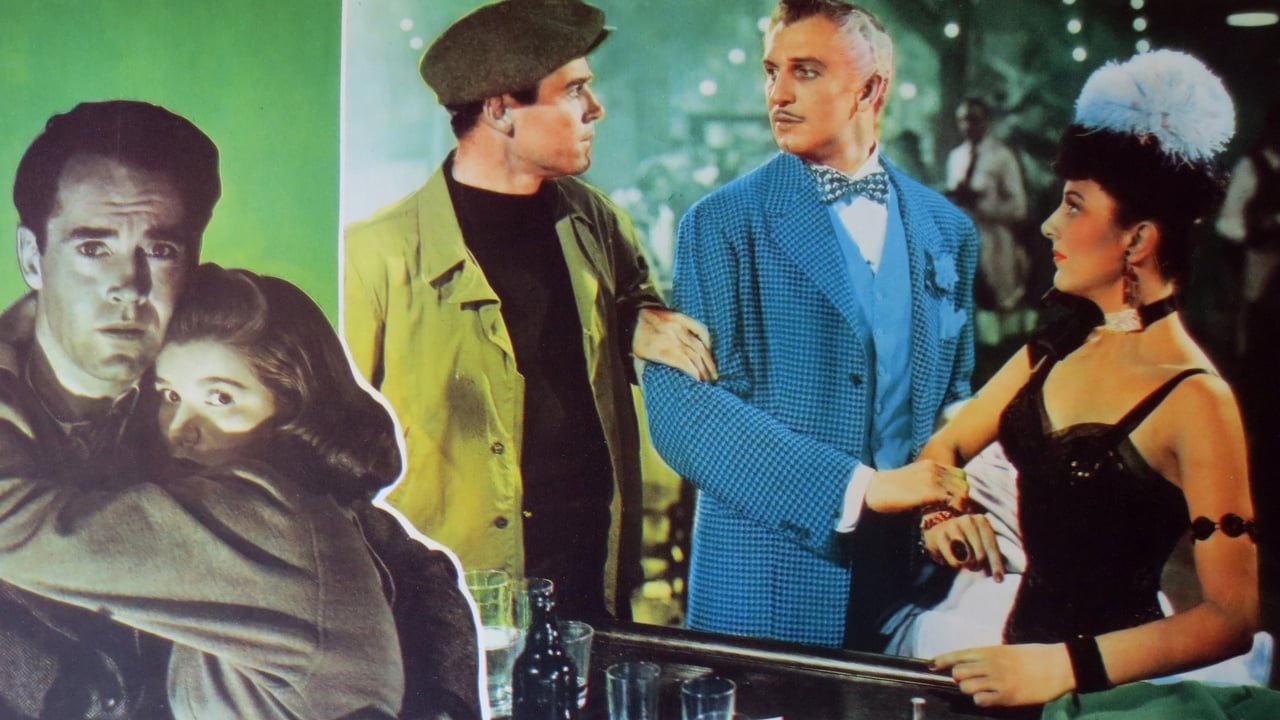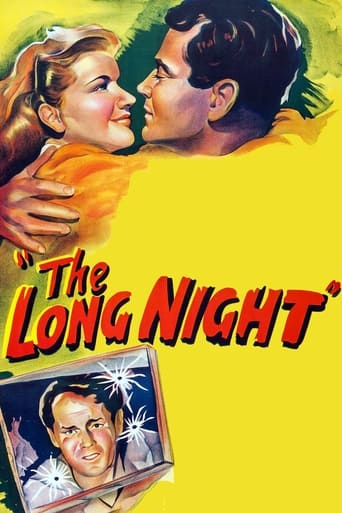

What makes it different from others?
... View MoreSuch a frustrating disappointment
... View MoreThis is a coming of age storyline that you've seen in one form or another for decades. It takes a truly unique voice to make yet another one worth watching.
... View MoreThe joyful confection is coated in a sparkly gloss, bright enough to gleam from the darkest, most cynical corners.
... View MoreThis is a brief review of "Decision Before Dawn", "Sorry, Wrong Number" and "The Long Night", three films by director Anatole Litvak.Born in the Ukraine, Litvak's career as a film-maker took him from Russia to Germany to France and eventually to Hollywood, where he became a contract director for Warner Bros. He directed "Decision Before Dawn, regarded as one of his finest pictures, in 1951. It tells the tale of Happy (Oskar Werner), a German soldier who, in 1944, defects and becomes an Ally double agent. At the command of American Colonel Devlin (Gary Merrill), Happy embarks on a mission deep behind German lines."Decision Before Dawn" was one of many Hollywood films released in the 1950s which attempted to rehabilitate Germans as "now our allies". Like the similarly themed "The Big Lift" (1950), it boasts superb location photography, Litvak filming in actual cities still scarred by war and still littered will real WW2 machinery. Whilst the film's promises of complexity are eventually betrayed, Litvak's establishing shots, handling of spaces and architecture, his grand outdoor vistas and a beautifully dour performance by Oskar Werner, elevate things tremendously. Werner would milk similar material in Martin Ritt's 1963 masterpiece, "The Spy Who Came in From the Cold". Today, "Decision Before Dawn" plays like a rebuke to Litvak's own "Confessions of a Nazi Spy" (1939), one of the first blatantly anti-Nazi films.Released in 1947, and a remake of Marcel Carne's superior "Le Jour Se Leve", Litvak's "The Long Night" stars Henry Fonda as Joe Adams, a man who blockades himself in an apartment following the murder of Maximillian the Great (Vincent Price), a nightclub magician. Via flashbacks we delve into the circumstances which led to this crime.Typical of Litvak, "The Long Night" boasts audacious camera work. Litvak's whip-pans, cranes, clever forced perspectives and snaking cameras were novel for the era, and his locations drip with atmosphere. While beautiful in a clinical way, Litvak's visuals still can't match Carne's poetic realism and the gauzy romantic humanism which made "Le Jour Se Leve" so famous. Litvak's film – noirish and brooding – also ends on a note of optimism, a reversal of the Carne's more downbeat ending. The film was a financial flop.Litvak released "Sorry, Wrong Number" (1948) a year later. A precursor to high-concept, modern thrillers, "Number" stars Barbara Stanwyck as Leona, a crippled woman who overhears a murder plot on her telephone. From her bedroom – the film's base of operations – Litvak's camera embarks on a dizzying quest to avert the crime, dipping into the past, different locations, through telephone lines and back out again."Sorry, Wrong Number" was based on a Lucille Fletcher radio play, which Litvak's aesthetic attempts to break free from. He glides from New York suites to State Island beaches to Manhattan skylines, but the film's print-oriented origins are hard to escape. Interestingly, Stanwyck's character is revealed to suffer from psychosomatic issues, and it is her very own flights-of-fancy, her constricting nature (epitomised by her crippled legs) which results in the film's central crime. Leona smothers her lover (Burt Lancaster), wants to make him as immobile as she is, a fact which pushes him into criminality. Throughout the film, Leona's stationariness is thus contrasted with the film's countless telephones and telephone wires, devices which seem to enable and amplify Leona's neuroses. Rather than connecting her to the outside world, these wires alienate Leona further, wrapping her up in paranoia and further illusions of control. Litvak followed "Number" up with "The Snake Pit", "Wrong Number's" thematic mirror image.7.5/10 – Worth one viewing. See "Young Man With a Horn" (1950) and "The Clock" (1945).
... View MoreI was not familiar with this film when it turned up on TCM, but I'm glad I didn't skip over it. It's a darned good "sort of" film noir, which for the most part seems rather realistic.Henry Fonda is excellent here as a WWII vet for whom things quickly go down hill, despite being well-liked by virtually everyone. And that's why his performance is so good -- he plays a wide variety of emotions here -- joy, love, despair, anger -- each done effectively.Barbara Bel Geddes made her film debut here, having come from Broadway. She was always a very different actress, as you see here, but quite effective. Ann Dvorak has an odd role here as a sort of "the other woman", and former state assistant to a magician. She is quite effective, as well. I'm not sure what to make of Vincent Price here. As the magician, and a liar, he is quite creepy, but I can't quite decide on the quality of his performance. One problem is that his makeup is quite distracting, and I think poorly done. So while he is supposed to be older and more mature, his skin looks very young while his hair is gray.One of the things that was done very effectively here was the telling of the story through flashbacks, including at one point a double-flashback! That technique is, in my view, often overdone. But here it is the perfect way to tell the whole story. Bravo to the screenwriters and the director! The score for this film is supposed to be notable...by Dimitri Tiompkin. Well, I don't see it as being notable...just overly loud and oppressive. And, that's odd. A film score is meant to compliment a film, not overpower it. And, I generally like Dimitri Tiompkin.Although the ending is not quite satisfying, this is a very good film that will keep you watching! Recommended.
... View MoreThis is certainly an entertaining piece of film. It does have a bit of time getting to the point and Fonda's character is unyielding to a fault. Vincent Price has made the mistake of not only winning, but feeling the need to rub someone's face in it. He did seem a bit surprised when Fonda shot him. The movie is told in several flashbacks and works pretty well. Barbara Bel Geddes is pretty emotional. Why are movie guys so stuck in sacrificial mode. The guy had to know that the authorities had no choice but to arrest him and possibly shoot him. Unless his lower class status was so overwhelming, it seems he would have had a reasonable chance. Anyway, it's a tense little piece of entertainment. Cagney might have been better, but Fonda's big sad eyes fill the bill.
... View More***SPOILERS*** The movie "The Long Night" starts with nightclub magician Maximilian, Vincent Price, getting blasted as he falls down two fights of stairs right in front of blinded US Marine vet Frank Dunlap, Elisha Cook Jr. As it turns out Maximilian got blown away by Joe Adams, Henry Fonda, whom he paid a visit in his one room apartment at the Travelers Hotel.As the police surround the hotel and try to take Joe Adams into custody we get this long flashback in what happened that lead up to Maximilian getting rubbed out. We see in retrospect that Joe was involved romantically with flower girl Jo Ann, Barbara Del Grebbs, whom he met, delivering flowers, in the power plant that he works at as a sandblaster. As it turned out both Joe and Jo Ann were orphans and spent their formative years at the local Good Shepard Orphanage.As things started heating up for the two lovebirds, Joe & Jo Ann, Maximilian suddenly dropped in-at the local nightclub "The Jungle"- and started to make a play for the very shy and sensitive Jo Ann. This lead Joe, in feeling that Jo Ann was two timing him, to get involved with Maximilian's former sidekick and assistant in his magic act Charlene, Ann Dvorak. Being the sensitive type himself, like Jo Ann, in not knowing whom his birth parents really are Joe in later having a mournful Maximilian confront him at a local diner is shocked to find out that Jo Ann is actually his, Maximilian's, daughter whom he abandoned at birth! The movie then goes from one flashback to another, and at one point even having a flashback within a flashback, where we and Joe find out what a first class BS artist Maximilian really is.It soon becomes evident that Maximilian is putting on an act to both confuse Joe and get into Jo Ann, who's as much his daughter as Joe is his son, pants! It's when Jo Ann tries to break off her relationship with the very determined and overbearing Maximilian that he goes to Joe's apartment and what happens there is whet we just got a glimpse off, with Maxiamilian getting blown away, what happened at the start of the film.In between the flashbacks, with Joe bearing his soul in the mess he got himself into, we have Joe holed up in his apartment holding off the entire city police force. It's only when Joe realizes that he's not alone in the world with Jo Ann and almost the entire town, in him being such a nice guy, coming to his defense that not only the cops but Joe himself cease firing giving himself a chance, in gunning down an unarmed man, to later prove his innocence in a court of law!***SPOILERS***You couldn't really feel that sorry for Joe in that not only did he put himself the local police as well as dozens of peoples lives, including Jo Ann, in jeopardy he acted like a real jerk in making himself out as the victim, in order to gain sympathy, in this whole scenario which in fact he wasn't. Talking about his experiences in the war and how he killed people in the defense of his country rang a bit hollow in his gunning down the totally helpless Maximilian who in fact handed him the gun that Joe shot and killed him with! Even though the movie ended with Joe giving himself up and looking like a hero, in gunning down an unarmed man?, we never got to see what the jury at his trial , after reviewing all the evidence in the case, final verdict was!
... View More